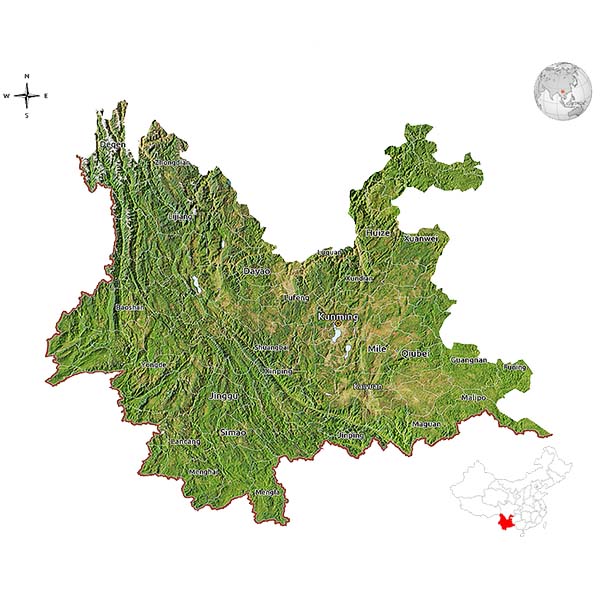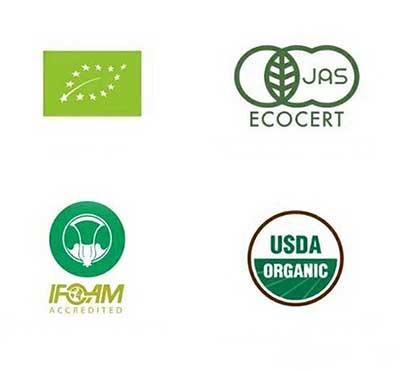Organic Golden Dragon Single Bud Black Tea
- Product Code: simple
- Availability: In Stock
Basic Info
Name: Organic Golden Dragon Single Bud Black Tea
Origin: Fengqing, Yunnan
Taste & Aroma: Mellow,smooth with sweet after taste,roasted caramel,chocolate,no astringent taste.
Tea Garden: Gaoshan Organic Black Tea Garden
Liquor: Dark red,clear and bright
Dry Leaf: Curled, slender,rolled,downy,showing a sharp point.
Harvest Period: Spring 2024
Altitude: 1000M above sea
Fermentation: Complete
Season: Spring tea
Item Form: Loose leaves
Ingredients: 100% tea buds
Tree Species: Yunnan large leaf variety
Shelf Life: 18 months at room temperature / 24months with low temperature storage
Storage: Stored in cool, airtight, opaque containers or keep in the refrigerator if condition permits
Organic Golden Dragon Single Bud Black Tea
Organic Golden Dragon Single Bud Black Tea is a variety of high-moutain organic black tea grown in Yunnan
mountains. It is named for the downy appearance of the strips that consist of only fat buds.The rolled
strips of Organic Golden Dragon Single Bud Black Teas are plump and covered with tons of golden fluff, like
fuzzy golden dragons.
The young buds for making this tea are originally covered with white hairs,
which can help the leaves absorb moisture in the air in dry seasons. Many Chinese teas have fine
hairs on the surface, and some famous teas are also named for this, such as the famous Bai Hao Yin Zhen Needle Tea. The strips of this tea are naturally curled,fuzzy and have sharp points.
The fresh buds used
to make this tea come from the Yunnan large-leaf tea trees, so the rolled strips of this tea are bolder and
thicker than other slender black teas such as Jin Jun Mei Black Tea and Dian Hong Black Tea.
Since this tea is harvested in spring, the content of theaflavins is relatively high. On the edge of the tea
cup, it shows a very clear golden ring which indicates that the tea contains plenty of polyphenol substance that
is the secret of mellow taste and full-bodied flavor. The taste of the liquor is smooth, mellow with
long-lasting sweet after taste with no bitter or astringent notes, finished with subtle caramelised sweetness.
This enduring organic Yunnan black tea could reach up to more than 6 infusions when brewed with traditional
Chinese Gongfu ways. The tea itself has a caramel flavor and its sweetness is enough that you don't have to add
sugar and milk to adjust the flavor.
Theaflavins Is An Important Influencing Factor Of High-Quality Black Tea.
The theaflavin is an important component of black tea and which plays a decisive role in the color, fragrance, taste and quality of black tea. It is the main component of the brightness of black tea soup, the important component of the taste intensity and freshness, and the most important substance to form the golden circle of tea soup. Some experienced tea lovers can judge the quality of tea by the color and thickness of the gold ring. The brighter the golden ring, the better the quality of the black tea.
The Golden Ring Formed By Theaflavins In Tea Cup
Show Full Description
Organic tea
Organic teas are made from tea leaves that are grown without the use of synthetic pesticides, fertilizers, or other chemicals. For more on organic tea, check out the information at the bottom of this page. For consumers who are concerned about the environmental impact of their food and beverage choices, or who are looking for a healthier option, this organic tea is a great choice.
Yunnan
Yunnan Province is located in the southwestern part of China and is the country's most diverse province in terms of geography and ethnicity. The province covers a large area of about 394,000 square kilometers and is known for its stunning natural scenery, including mountains, plateaus, valleys, and lakes. Yunnan Province is one of the main tea-producing regions in China, with a long history of tea cultivation. The province has a favorable climate, fertile soil, and diverse geography, making it ideal for the growth of a variety of tea plants. Dianhong, a famous historical tea, was created in 1939 and produced in southwest Yunnan. It is a rising star of Chinese Gongfu black tea. Dianhong is short for Yunnan black tea, mainly produced in Fengqing, Yunxian, Baoshan, Xishuangbanna, Pu-erh, etc.
History
Yunnan black tea is called Dianhong (Diān hóng 滇红) for short, which belongs to black tea category. It was first produced by tea farmers in the 1930s.
In September 1938, commissioner Zheng Hechun and technician Feng Shaoqiu were sent by the China Tea Company to Yunnan Province to investigate tea production and marketing in Yunnan.
They arrived in Fengqing in November and found that Fengshan in Fengqing County has good natural conditions for the growth of tea trees, so they began trial - producing black tea in Fengqing.
Through continuous efforts, in 1939, the first batch of 500 tons (China weight unit, one load is equal to 50 kilograms) of Yunnan red was successfully trial-produced.

Yunnan
Then the new batch of black tea was transported to Hong Kong within bamboo tea cages, and then put on the market in wooden cases and aluminum cans. Surprisingly, it was warmly welcomed by customers in Hong Kong. It has proved to be a successful tea and eventually named with its place of origin (Dian Hong) by Mr. Feng.
In order to further expand the production of Yunnan black tea.In early 1939, Feng Shaoqiu was ordered to build Fengqing Tea Factory (then called Shunning Experimental Tea Factory). At the same time, a large number of technical personnel from Zhejiang, Anhui, Hunan, Jiangxi and other provinces were called to Yunnan to engage in tea production in Yunnan.
Some local tea farmers often take part in the company's tea training courses, which indirectly provides human resources for yunnan black tea to expand reproduction.
In 1940, yunnan black tea changed its name to "Dianhong", and the name "Dianhong" has been used ever since.At present, yunnan black tea production areas are mainly concentrated in more than 20 counties in six prefectures along the Lancang River in Yunnan, namely Lincang, Baoshan, Simao, Xishuangbanna, Dehong and Honghe.

Theaflavin
Processing
1.Plucking
The harvesting of Yunnan black tea usually starts from mid-March to mid-November and lasts about 8 months. Spring tea picked from mid-March to mid-May accounts for 55% of the total annual output, summer tea from mid-May to mid-August accounts for about 30% of the whole year and the production of autumn tea from late August to mid-November accounts for about 15% of the annual production. The standards for picking varies according to the different tea grades. Considering the quality and output, one bud and two or three leaves are picked, except that one bud and one leaf are required for super grade Yunnan black tea.
2.Withering / wiltinger
Withering is the first working procedure of black tea production and the basic process of forming the quality of black tea. Withering has two purposes: first, its purpose is to evaporate some water so as to be rolled into strips and allows a very small amount of oxidation; Second, it is beneficial to the change of internal chemical. It plays an important role in promoting the decomposition of leaf proteins into free amino acids and increases the availability of free caffeine, both of which will change the taste of the tea.

Leaves Of Large Leaf Cultivar
3.Rolling (Chinese: 揉捻; pinyin: róu niǎn)
There are three purposes of kneading: first, the green cell tissue of tea is destroyed by kneading, so that the tea juice flows out; Second, the loose leaves are kneaded into a tight straight rope to reduce the size; Thirdly, make the tea juice overflow and gather on the surface of the leaves, which can form a glossy and oily appearance, which is helpful to bring out the tea flavor when brewing.
3.Fermentation
This is the key step to forming the unique quality of black tea. The fermentation of black tea is generally to put the twisted tea into a fermentation basket or fermentation workshop for fermentation. The suitable temperature, humidity and oxygen content for the oxidative polymerization of tea polyphenols should be controlled well in the fermentation process. Generally, the room temperature is 22 ~ 30℃, and the relative humidity is above 90%. Fermentation is the most crucial step in the process of making black tea. In this step, polyphenolic compounds undergo profound changes to form theaflavins, thearubigins, and theafuscin, which make black tea have the characteristics of red soup, red leaves, and sweet taste.

Buds Of Large Leaf Cultivar
4.Shaping
This technology is not the standard technology for making black tea. If we want black tea to have some unique shapes, such as our spiral tea, we need to use machines or hand to shape fermented tea into various shapes we need.
5.Drying
Drying is the last working procedure of making black tea. Generally, it has to be done twice. The first drying is called 毛火 (rough fire), and the second drying is called 足火 (full fire). There should be a gap between the rough fire and the full fire. It has three purposes: First, quickly inactivate the activity of enzyme with high temperature, prevent enzymatic oxidation, and fix the fermentation quality. The second is to further evaporate water,fix shape,maintain quality. Third, remove the smell of grass and retain the unique sweet smell of black tea.
Organic Tea Standards
Organic tea is a kind of pollution-free and pure natural tea
Organic tea uses natural green fertilizer in the planting process, and adopts biological or physical methods to prevent and control diseases and insect pests. It is based on natural farming, and it is not allowed to use any chemically synthesized pesticides and fertilizers. Chemical additives are not used in the processing of organic tea. In the whole production and processing process, organic tea keeps the most complete aroma and taste of tea, and at the same time, it minimizes the pollution to the environment. Organic tea is produced in accordance with the standards of the International Federation of Organic Agriculture Movements (IFOAM), and has passed the organic certification of the Organic (Natural) Food Certification Organization.
Some of approved certifying organisations:
|
United States |
USDA |
| European Union |
ECO-CERT, European Commission |
|
Australia |
NASAA , ACO |
| France |
ECO-CERT , COSMEBIO |
| UK |
SOIL ASSOCIATION |

You can find your favorite organic teas in Teapooo. We make a commitment that the organic teas we provide are grown and produced without any chemical synthetic pesticides and fertilizers, and without any chemical additives in the production of organic tea. Our organic teas come from trusted and reputable organic tea suppliers in China, and has undergone our strict examination. Our primary goal is to provide delicious and healthy organic teas to tea lovers around the world. The organic teas we supply have been certified by one or more certifying organisations (such as JAS, USDA, ECO-CERT, NASAA, etc) and obtained the certificates issued by them. You can find copies of these certificates on our product detail pages.
| Chinese Gongfu Method | |
| Tea | 3g |
| Water | Gaiwan 3oz / 90ml |
| Time | 6 infusions : 5s,10s,15s,20s,30s,35s |
| Temperature | 85ºC / 185ºF |
| Teapot Method | |
| Tea | 5g |
| Water | Teapot (14oz /400ml) |
| Time | 1 - 3 mins |
| Temperature | 85ºC / 185ºF |























